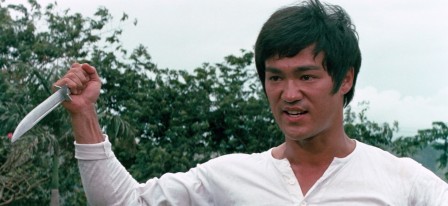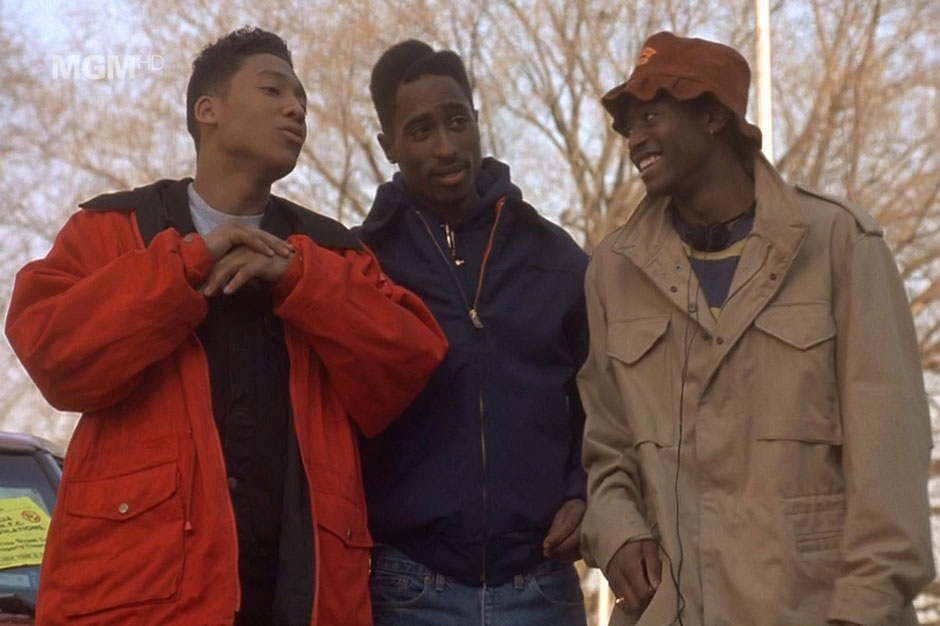#532 - Going Clear: Scientology and the Prison of Belief
Alex Gibney, 2015

A documentary about the highly controversial Church of Scientology.
The Church of Scientology has become quite the walking punchline over the course of the past decade or so thanks to their litigation-happy attacks on any possible opposition, to say nothing of the erratic and fundamentalist public appearances by the most high-profile member of the movement, Hollywood A-lister Tom Cruise. Though Alex Gibney's Going Clear (based on Lawrence Wright's book of the same name) does touch on the aspects of Scientology that have served to make it a laughing stock in recent years, it is very clear that the film's examination of Scientology goes above and beyond something as basic as shallow mockery. Wright claims that his intention was not supposed to be a derisive exposé of Scientology's dark secrets so much as an earnest attempt to understand what it was about this incredibly unorthodox movement that had managed to draw so many people into joining. To this end, much of the film involves interviews with many individuals who were at some point devoted members of the Church but had since left and were willing to speak openly about their time with the Church (with the only one I immediately recognised being Oscar-winning filmmaker Paul Haggis, though most of them are not celebrities anyway). This collection of individuals provides the backbone for a film that attempts to paint a warts-and-all portrait of Scientology based in the personal experiences of members who wished to speak out against it.
The film spends its first third or so tracing Scientology's origins by describing and examining the Church's creator and original leader, pulp science-fiction author L. Ron Hubbard. Hubbard is initially depicted as exactly the kind of charlatan that detractors of the Church consider him to be, with the decision to adapt his original self-help system Dianetics into a full-blown religious movement apparently motivated by the promise of taxation-free financial gain. Other developments serve to paint him as a genuinely unhinged person, whether it's his ex-wife's account of him kidnapping their child or evidence of him trying to acquire psychiatric help before eventually asking to be lethally electrocuted in order for his problems to be "cured". Other bizarre developments may prompt some uneasy laughter, especially when Haggis incredulously recounts the time that he learned what was then one of the Church's top secrets - the Hubbard-penned creation myth involving ancient alien souls from another planet - and how it drastically changed his opinion of Scientology (though not enough for him to immediately quit). However, the laughter drops out for good with Hubbard's passing and his replacement as leader by David Miscavige, a Scientologist since childhood who took over as a young man in the 1980s and has presided over the Church ever since.
The film treats Miscavige's ascension to the top of the Church hierarchy as a darker reiteration on Hubbard's already rather sinister time as leader. Hubbard originally attempted to avoid paying taxes by globe-traveling and hiding out; under Miscavige, members simply managed to file so many lawsuits against the IRS that they were effectively pressured into granting the Church tax-exempt status. The earnest success story of a fresh-faced young actor named John Travolta (who is implied to be blackmailed into staying within the Church) eventually gives way to the rise of Tom Cruise, whose notoriously fanatical attitude about Scientology is just the tip of a very large iceberg as the rest of the organisation works overtime to fulfill his every possible whim. The inexpensive, grueling, and blatantly unethical labour undertaken by the members of the movement's "Sea Organisation" under Hubbard's watch soon devolves into many accounts of physical, mental, and emotional abuse that is not only permitted by Miscavige but also occasionally carried out by him personally. The only thing more disturbing than the actual instances of abuse and neglect described in the interviewees' recollections is the cult-like air that permeates said recollections, with many of them talking about just how much torment they were able to tolerate before finally deciding to break away from the Church.
Going Clear runs for a full two hours and does threaten to test one's patience once or twice, but for the most part it's a frighteningly compelling insight into what goes on within the Church of Scientology. In addition to depicting what it's like inside the Church, it also shows just what happens when the Church's influence turns toxic for people both inside and outside the Church. Indelible images abound, whether it's actual footage of Scientologists singing "Happy Birthday" to a giant portrait of Hubbard a year after the man's death or even a dramatisation involving a violent game of musical chairs set to the tune of "Bohemian Rhapsody". Much of the film is focused on talking-heads interviews with former Scientologists, who do make for fascinating subjects regardless of how heavily involved they were with the Church (ranging from Travolta's personal assistant to some of Miscavige's most immediate subordinates and spokespeople). The wide range of archival footage does create quite the lasting impression and is thankfully emphasised over dramatisations, which are brief and sparsely used. Though one can easily accuse it of being overly biased against Scientology to the point of being worthless on an objective level, Going Clear makes sure to end with an acknowledgment of the fact that the makers did try to secure interviews with prominent members of the movement such as Miscavige, Cruise, and Travolta. The flat-out refusal to offer any defence of the Church is sort of an understandable response to a film that's pretty dedicated to digging up the Church's dirt; however, this means that something as simple as a sub-title that merely reads "Tom Cruise's attorney denied this" with no further elaboration is potentially more damning than anything the film-makers and interviewees could deliver.
Alex Gibney, 2015

A documentary about the highly controversial Church of Scientology.
The Church of Scientology has become quite the walking punchline over the course of the past decade or so thanks to their litigation-happy attacks on any possible opposition, to say nothing of the erratic and fundamentalist public appearances by the most high-profile member of the movement, Hollywood A-lister Tom Cruise. Though Alex Gibney's Going Clear (based on Lawrence Wright's book of the same name) does touch on the aspects of Scientology that have served to make it a laughing stock in recent years, it is very clear that the film's examination of Scientology goes above and beyond something as basic as shallow mockery. Wright claims that his intention was not supposed to be a derisive exposé of Scientology's dark secrets so much as an earnest attempt to understand what it was about this incredibly unorthodox movement that had managed to draw so many people into joining. To this end, much of the film involves interviews with many individuals who were at some point devoted members of the Church but had since left and were willing to speak openly about their time with the Church (with the only one I immediately recognised being Oscar-winning filmmaker Paul Haggis, though most of them are not celebrities anyway). This collection of individuals provides the backbone for a film that attempts to paint a warts-and-all portrait of Scientology based in the personal experiences of members who wished to speak out against it.
The film spends its first third or so tracing Scientology's origins by describing and examining the Church's creator and original leader, pulp science-fiction author L. Ron Hubbard. Hubbard is initially depicted as exactly the kind of charlatan that detractors of the Church consider him to be, with the decision to adapt his original self-help system Dianetics into a full-blown religious movement apparently motivated by the promise of taxation-free financial gain. Other developments serve to paint him as a genuinely unhinged person, whether it's his ex-wife's account of him kidnapping their child or evidence of him trying to acquire psychiatric help before eventually asking to be lethally electrocuted in order for his problems to be "cured". Other bizarre developments may prompt some uneasy laughter, especially when Haggis incredulously recounts the time that he learned what was then one of the Church's top secrets - the Hubbard-penned creation myth involving ancient alien souls from another planet - and how it drastically changed his opinion of Scientology (though not enough for him to immediately quit). However, the laughter drops out for good with Hubbard's passing and his replacement as leader by David Miscavige, a Scientologist since childhood who took over as a young man in the 1980s and has presided over the Church ever since.
The film treats Miscavige's ascension to the top of the Church hierarchy as a darker reiteration on Hubbard's already rather sinister time as leader. Hubbard originally attempted to avoid paying taxes by globe-traveling and hiding out; under Miscavige, members simply managed to file so many lawsuits against the IRS that they were effectively pressured into granting the Church tax-exempt status. The earnest success story of a fresh-faced young actor named John Travolta (who is implied to be blackmailed into staying within the Church) eventually gives way to the rise of Tom Cruise, whose notoriously fanatical attitude about Scientology is just the tip of a very large iceberg as the rest of the organisation works overtime to fulfill his every possible whim. The inexpensive, grueling, and blatantly unethical labour undertaken by the members of the movement's "Sea Organisation" under Hubbard's watch soon devolves into many accounts of physical, mental, and emotional abuse that is not only permitted by Miscavige but also occasionally carried out by him personally. The only thing more disturbing than the actual instances of abuse and neglect described in the interviewees' recollections is the cult-like air that permeates said recollections, with many of them talking about just how much torment they were able to tolerate before finally deciding to break away from the Church.
Going Clear runs for a full two hours and does threaten to test one's patience once or twice, but for the most part it's a frighteningly compelling insight into what goes on within the Church of Scientology. In addition to depicting what it's like inside the Church, it also shows just what happens when the Church's influence turns toxic for people both inside and outside the Church. Indelible images abound, whether it's actual footage of Scientologists singing "Happy Birthday" to a giant portrait of Hubbard a year after the man's death or even a dramatisation involving a violent game of musical chairs set to the tune of "Bohemian Rhapsody". Much of the film is focused on talking-heads interviews with former Scientologists, who do make for fascinating subjects regardless of how heavily involved they were with the Church (ranging from Travolta's personal assistant to some of Miscavige's most immediate subordinates and spokespeople). The wide range of archival footage does create quite the lasting impression and is thankfully emphasised over dramatisations, which are brief and sparsely used. Though one can easily accuse it of being overly biased against Scientology to the point of being worthless on an objective level, Going Clear makes sure to end with an acknowledgment of the fact that the makers did try to secure interviews with prominent members of the movement such as Miscavige, Cruise, and Travolta. The flat-out refusal to offer any defence of the Church is sort of an understandable response to a film that's pretty dedicated to digging up the Church's dirt; however, this means that something as simple as a sub-title that merely reads "Tom Cruise's attorney denied this" with no further elaboration is potentially more damning than anything the film-makers and interviewees could deliver.
__________________
Iro's Top 100 Movies v3.0
I really just want you all angry and confused the whole time.




 . My favourite film of the year so far.
. My favourite film of the year so far.







